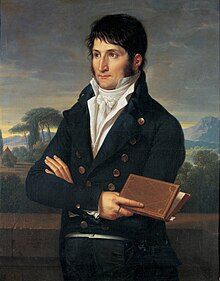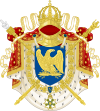Lucien Bonaparte
Lucien Bonaparte | |
|---|---|
 Portrait byFrançois-Xavier Fabre,1808 | |
| Minister of the Interior | |
| In office 25 December 1799 – 7 November 1800 | |
| Preceded by | Pierre-Simon Laplace |
| Succeeded by | Jean-Antoine Chaptal |
| President of theCouncil of Five Hundred | |
| In office 23 October 1799 – 12 November 1799 | |
| Preceded by | Jean-Pierre Chazal |
| Succeeded by | Antoine Boulay de la Meurthe |
| Member of theCouncil of Five HundredforLiamone | |
| In office 12 April 1798 – 26 December 1799 | |
| Personal details | |
| Born | 21 May 1775 Ajaccio,Corsica,France |
| Died | 29 June 1840(aged 65) Viterbo,Papal States |
| Spouses | |
| Parents |
|
| Signature |  |
Lucien Bonaparte, 1st Prince of Canino and Musignano(bornLuciano Buonaparte;21 May 1775 – 29 June 1840), was a French politician and diplomat of theFrench Revolutionand theConsulate.He served asMinister of the Interiorfrom 1799 to 1800 and as the president of theCouncil of Five Hundredin 1799.
The third surviving son ofCarlo Bonaparteand his wifeLetizia Ramolino,Lucien was the younger brother ofNapoleon Bonaparte.As president of the Council of Five Hundred, he was one of the participants of theCoup of 18 Brumairethat brought Napoleon to power in France.
Early life[edit]
Lucien was born inAjaccio,Corsicaon 21 May 1775. He was educated in mainland France, initially studying at the military schools ofAutunandBrienne.After his father's death, he attended the seminary ofAix-en-Provence,from which he dropped out in 1789.[1]
Revolutionary activities[edit]
Lucien became a staunch supporter of theFrench Revolutionupon its outbreak in 1789, when he was 14 years old.[2]He returned to Corsica at the start of the Revolution, and became an outspoken orator at the Corsican chapter of theJacobin Clubin Ajaccio, where he adopted the alias "BrutusBonaparte ".[2][1]In 1791, he became a secretary to Corsican patriotPasquale Paoli,but broke with him in May 1793 (along with his brother Napoleon).[2]
After returning to mainland France, Lucien held a number of minor administrative posts from 1793 until 1795, when he was briefly jailed for his Jacobin activity, during theThermidorian Reaction.[1]He was released thanks to Napoleon's intervention, who then found him an administrative assignment in theArmy of the North.[1]
Political career[edit]
In 1798, Lucien waselectedmember of theCouncil of Five Hundredfor Corsica'sLiamonedepartment (although he was not old enough to run for election).[1]In the legislature, he mostly voted with the Neo-Jacobins, and participated in theCoup of 30 Prairial VII.However,Emmanuel Joseph Sieyès' influence and news of theevents in Egyptled to a shift in his political stance, and Lucien became one of the main plotters ofcoup d'étatof18 Brumaire,in which Napoleon overthrew the government of theDirectoryto replace it by theConsulate.
On 23 October 1799, Lucien was elected president of the Council of Five Hundred. On 9 November 1799 (18 Brumaire Year VIII on theFrench Republican Calendar), he had pamphlets distributed in Paris that detailed a fake Jacobin plot, which he used to justify the relocation of the Council to the suburban security ofSaint-Cloud.[1]The next day, while presiding over a heated council session, Lucien managed to buy time until Napoleon's sudden entrance into the chamber surrounded bygrenadiers.[1]During the coup, Lucien swore he would stab his brother in the chest if he ever betrayed the principles ofLiberté, égalité, fraternité.[1]The following day, Lucien arranged for Napoleon's formal election asFirst Consul.
Under the Consulate, Lucien was appointedMinister of the Interiorin December 1799.[1]In this capacity, Lucien oversaw the appointment of the firstprefectsand falsified the results of theconstitutional referendumof February 1800.[1]He clashed over the right to oversee Paris police matters withJoseph Fouché,[1]the Minister of Police, who showed Napoleon a subversive pamphlet possibly written by Lucien and effected a breach between the brothers. Some evidence exists that Napoleon himself wrote the pamphlet and scapegoated his brother when it was received poorly.[3]He resigned as minister in November 1800.[1]
Following his resignation, Lucien was sent as ambassador to the court of KingCharles IV of Spain,where his diplomatic talents won over theBourbonroyal family and, perhaps as importantly, the ministerManuel de Godoy.[4]In March 1801, Lucien and Godoy signed theTreaty of Aranjuez,establishing the French client kingdom ofEtruria.[1]
Disputes with Napoleon[edit]
Though he was a member of theTribunatin 1802 and was made a senator of theFirst French Empire,Lucien came to oppose many of Napoleon's ideas. In 1804, with Lucien disliking Napoleon's intention to declare himself as Emperor of the French and to marry Lucien off to a Bourbon Spanish princess,the Queen of Etruria,Lucien spurned all imperial honours and went into self-imposed exile by living initially inRome,where he bought theVilla RufinellainFrascati.
Later years[edit]

In 1809, Napoleon increased pressure on Lucien to divorce his wife and return to France, even having their mother write a letter encouraging him to abandon her and return. With the whole of thePapal Statesannexed to France and the Pope imprisoned, Lucien was a virtual prisoner in his Italian estates, requiring permission of the Military Governor to venture off his property. He attempted to sail to the United States to escape his situation but was captured by theBritish.[1]When he disembarked in Britain, he was greeted with cheers and applause by the crowd, many of whom saw him as anti-Napoleonic.
The government permitted Lucien to settle comfortably with his family atLudlow,and later at Thorngrove House inGrimley,Worcestershire, where he worked on a heroic poem onCharlemagne.Napoleon, believing Lucien had deliberately gone to Britain and thus a traitor, had Lucien omitted from the Imperialalmanacsof the Bonapartes from 1811 until his 1814 abdication.
Lucien returned to France following his brother's abdication in April 1814.[1]He continued to Rome, where on 18 August 1814 he was madePrince of Canino,Count of Apollino, and Lord of Nemori byPope Pius VII.[5]
In theHundred Daysafter Napoleon's return to France from exile inElba,Lucien rallied to his brother's cause, and they joined forces once again during Napoleon's brief return to power.[1]His brother made him a French Prince and included his children into the Imperial Family, but this was not recognized by the Bourbons after Napoleon's second abdication. Subsequently, Lucien was proscribed at theRestorationand deprived of hisfauteuilat theAcadémie Française.He was made Prince of Musignano on 21 March 1824 byPope Leo XII.[5]In 1836 he wrote hisMémoires.He died inViterbo,Italy,on 29 June 1840, ofstomach cancer,the same disease that claimed his father and, reportedly, his brother Napoleon.[5]
Academic activities[edit]
Lucien Bonaparte was the inspiration behind the Napoleonic reconstitution of the dispersedAcadémie Françaisein 1803, where he took a seat. He collected paintings inla maison de campagneatBrienne,was a member ofJeanne Françoise Julie Adélaïde Récamier'ssalonand wrote a novel,La Tribu indienne.He was an amateur archeologist, establishing excavations at his property inFrascatiwhich produced a complete statue ofTiberius,and at Musignano which rendered a bust ofJuno.Bonaparte owned a parcel which had once formed part ofCicero's estate called Tusculum, and was much given to commenting on the fact. In 1825, Bonaparte excavated the so-calledTusculum portraitofJulius Caesarat the Tusculum'sforum.[6]
In 1823, Bonaparte was elected as a member of theAmerican Philosophical Society.[7]
Marriages and children[edit]
His first wife was his landlord's daughter,Christine Boyer(3 July 1771 – 14 May 1800),[8]the illiterate sister of an innkeeper ofSaint-Maximin-la-Sainte-Baume,and by her he had four children:
- Filistine Charlotte(28 November 1795 – 6 May 1865), married Prince MarioGabrielli.
- Stillborn son (13 March 1796).
- Victoire Gertrude (born and died 9 July 1797).
- Christine Charlotte Alexandrine Egypte (18 October 1798 – 1847), married firstly Count Arvid Posse (divorced) and secondlyLord Dudley Stuart.
His second wife wasAlexandrine de Bleschamp(23 February 1778 – 12 July 1855), widow of Hippolyte Jouberthon, known as "Madame Jouberthon",[9]and by her he had ten children:
- Charles Lucien Bonaparte(24 May 1803 – 29 July 1857), the naturalist andornithologist.
- Letizia (1 December 1804 – 15 March 1871), marriedSirThomas Wyse.
- Joseph (14 June 1806 – 15 August 1807).
- Jeanne (22 July 1807 – 22 September 1829), married Marquis Honoré Honorati.
- Paul Marie(3 November 1809 – 7 September 1827).
- Louis Lucien(4 January 1813 – 3 November 1891). A philologist and politician, expert on theBasque language.
- Pierre Napoleon(11 October 1815 – 7 April 1881).
- Antoine (31 October 1816 – 28 March 1877), married Carolina Maria Anna Cardinali, without issue.
- Marie Alexandrine(10 October 1818 – 20 August 1874), married Vincenzo Valentini, Count di Laviano.
- Constance (30 January 1823 – 5 September 1876), a nun.
Coat of arms[edit]
-
Coat of arms of the Bonaparte family
-
Coat of arms as Prince of Canino and Musignano
-
Coat of arms as a French prince during theHundred Days
References[edit]
- ^abcdefghijklmnop"Lucien Bonaparte (Prince of Canino), 1775-1840, Minister".napoleon.org.Fondation Napoléon.
- ^abcHarrison W. Mark (14 July 2022)."Napoleon Bonaparte During the Early French Revolution (1789-1794)".World History Encyclopedia.
- ^Scurr, Ruth,Napoleon: A Life Told in Gardens and Shadows,(Liveright, 2021), pp 119.
- ^Schom, Alan,Napoleon Bonaparte,(HarperCollins Publishers, 1997), pp 237, 238.
- ^abcStroud, Patricia Tyson,The Emperor of Nature: Charles-Lucien Bonaparte and his world,(University of Pennsylvania Press, 2000), pp.21; 160.
- ^The J. Paul Getty Museum (1987).Ancient Portraits in the J. Paul Getty Museum: Volume 1.Getty Publications. p. 24.ISBN0892360712.
- ^"APS Member History".search.amphilsoc.org.Retrieved6 April2021.
- ^de Bourrienne, Louis Antoine Fauvelet and Ramsay Weston Phipps,Memoirs of Napoleon Bonaparte,Vol.1, (Charles Scribner's Sons:New York, 1895), 100.
- ^Atteridge, Andrew Hilliard and Jérôme Bonaparte,Napoleon's brothers,(Methuen and Co.:London, 1909), 98.
Further reading[edit]
- Marcello Simonetta & Noga Arikha,Napoleon and the Rebel: A Story of Brotherhood, Passion, and Power(Palgrave Macmillan, 2011)ISBN978-0-23011-156-1
External links[edit]
- Académie Francaise: Les Immortels:(in French)
- Lucien Bonaparte
- 1775 births
- 1840 deaths
- Politicians from Ajaccio
- Jacobins
- House of Bonaparte
- Princes of Canino and Musignano
- Princes of France (Bonaparte)
- French diplomats
- French Roman Catholics
- People of the French Revolution
- Members of the Council of Five Hundred
- Expelled members of the Académie Française
- Members of the Sénat conservateur
- Members of the Chamber of Peers of the Hundred Days
- French interior ministers
- Deaths from stomach cancer
- Deaths from cancer in Lazio






